Last Wednesday, November 28th, we had an info session for different summer opportunities featuring professional staff and student advisors from the Haas Center for Public Service, Handa Center for Human Rights and International Justice, Global Studies Internship Program, and Undergraduate Advising and Research.
The major takeaway is: Don’t get intimidated by the application process or the overwhelming amount of opportunities available to you. This means there is a perfect fit waiting for you! Get started with your search now and own your summer experience.
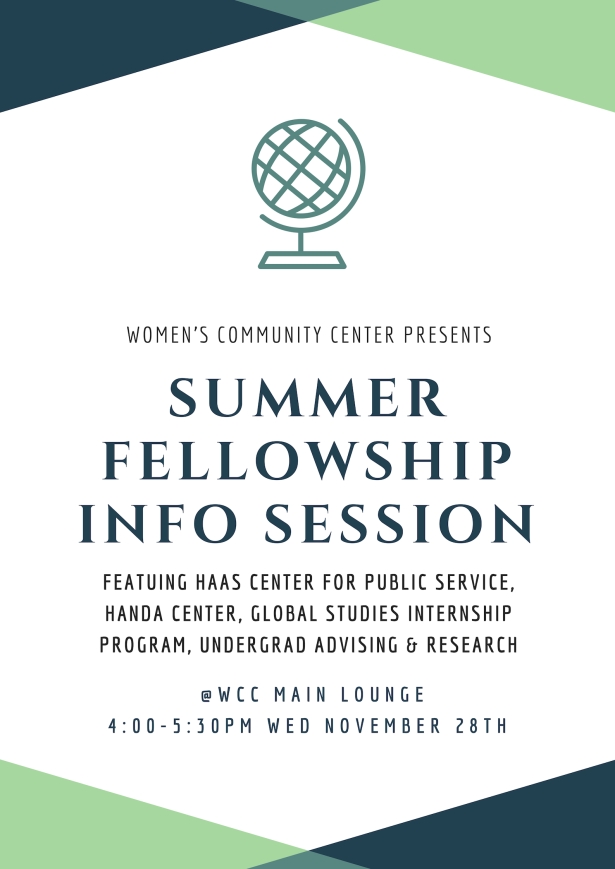
Here are the summaries of presentations + Q&A sessions for each center:
Refer below for useful links and updates on additional info sessions and workshops hosted by each center.
Haas
Emma Hartung Cardinal Quarter Coordinator has shared the slides from her presentation and other useful links to get started on connecting with community partners and help you navigate different Haas summer fellowships. This link contains information on finding community partners, and fellowship application timeline. Click here for a list of fellowships offered this year and customize your search by selecting locations, pre-assigned/self-designed, and appropriate grade levels.
The Haas Center also has walk-in-advising with program staff on Fridays between 12-3pm on the second floor or you can email cardinalquarter@stanford.edu to set up an appointment.
Handa
Take a look here to learn about different fellowships offered through Handa Center.
Same as most other applications, Handa applications are due in early February. Handa Center for Human Rights and International Justice is looking for applicants with passion, ability to make a local or global impact, and appropriate understanding of the cultural working context. Come to office hours to talk with professional staff and advisors about your interest and get connected with community partners, either national or international, based on your interest. Important questions to ponder when designing your own fellowships: 1. Are you interested in working in a specific region? Do you want to practice a specific language? 2. Are you interested in working on a specific human rights topic?
Then, start looking for names of organizations that often appear in literature or news about particular human rights topics that you feel passionate about. If the organization you’re interested in has a big name (sometimes, this means having a more rigorous application process or deadline), check out community partners that work closely with or are sponsored by the “big-name” organization. You might be able to make a larger impact working on a local project.
Handa Center will host an info session on Summer Fellowships and Internships on Monday, January 14th at 4pm in Encina Hall West 219.
Global Studies Internship
Peer advisor Joanne Shang has shared the slides from her presentation. Applications open in early January and close in February, so start looking through the list of internships. Plan ahead especially if you’re interested in a self-designed internship. Global Studies Internship Program will host a comprehensive info session on Tuesday, January 15th at 4pm in Oksenberg Room, 3rd Floor Encina Hall Central.
UAR
UAR provides departmental grants, major grants, and small grants. Small grants are due on the 1st of every month and they could be used for part-time research work (e.g. If you are traveling to China for another internship and have a sociology project in mind, you can apply for a small grant to lead the research alongside your internship.) Grants during the academic year do not fund salaries/lodging/living expenses, but grants during the summer can provide salaries/lodging/living expenses. Contact your academic advisor or Research Communities Manager Jill Wentzell at wentzell@stanford for more information.
Visit this website for more information on research grants. This year’s information will be updated in January, but feel free to gauge at past opportunities to start your plans. Most of these programs are frosh/sophomore friendly unless otherwise stated by the department.
Other general tips for finding fellowships/research opportunities:
- How to connect with Faculty Advisors: Visit them during office hours. Look for their office hours on their websites (google search) or email Student Services Officer (SSO, for short) for information on their office hours. Get on mailing lists for departments you are interested in. Many research opportunities are announced through department mailing lists.
- Departmental grant programs for the summer (*except Bio-X Summer Research Program) do not require you to find your own faculty mentors. Apply through UAR and get connected with a faculty mentor.
- How to connect with local organizations and mentors outside Stanford:
- Look for Stanford alumni on LinkedIn and Stanford Alumni Mentoring (SAM).
- Reach out to community partners in various creative ways (e.g. look for specific names and emails, make calls, try connecting to multiple people in the same organization).
- If you need help connecting with mentors, use resources at BEAM. Career Catalyst Joslyn Johnson (joslyn.johnson@stanford.edu) holds regular office hours in the WCC on Tuesdays from 2-3:00pm.
Tips for writing a compelling application:
- Show your passion and interest. Tell the reader why you are applying for this position/internship. Although some applications look for experience and specific skills, many of them look for why you are interested in this particular opportunity, not necessarily how much previous experience you already have.
WCC will host an application writing workshop with Hume Writing tutors in early Winter Quarter, so keep an eye out for it!
Alex
Academic Coordinator

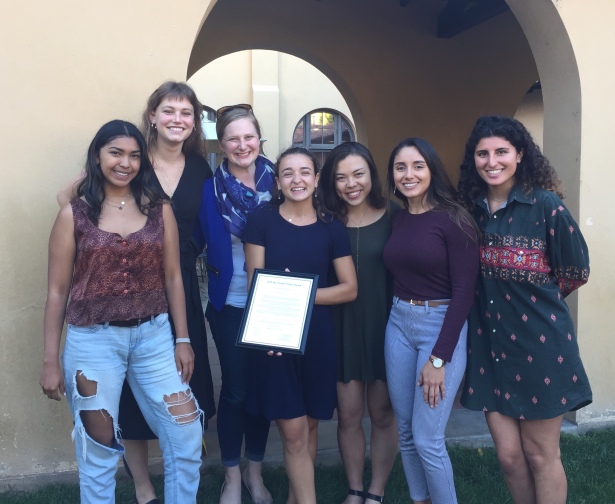



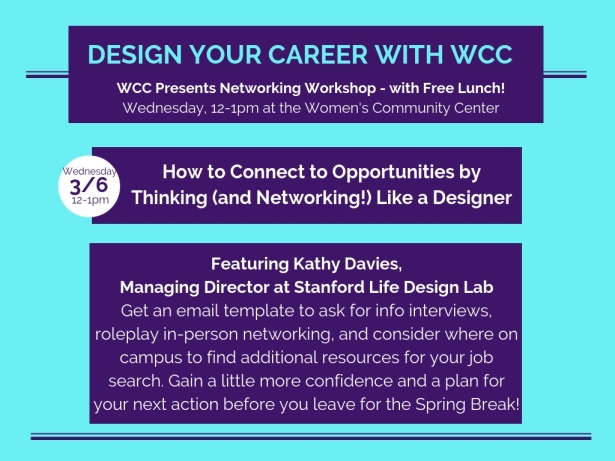
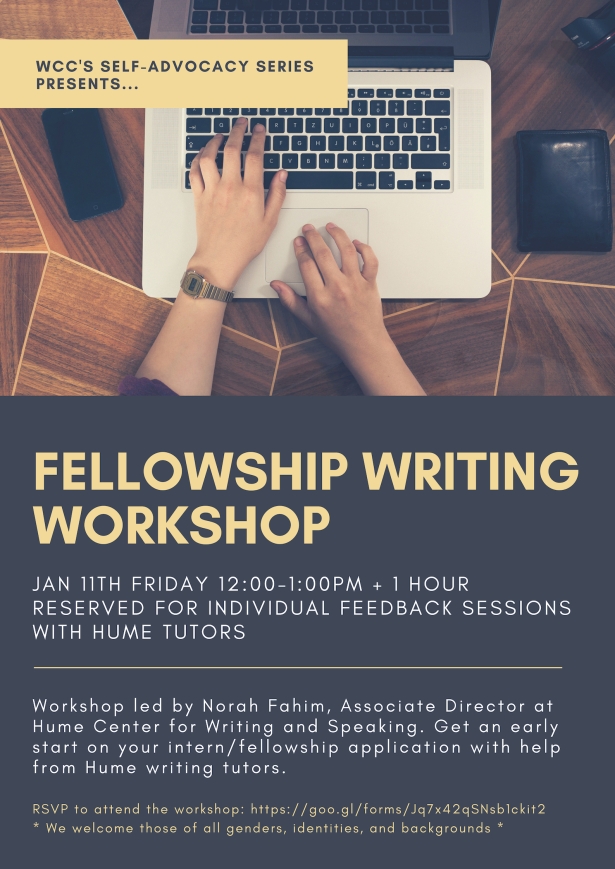 On Friday, January 11th, the Women’s Community Center hosted an application writing workshop for summer intern/fellowships, featuring Dr. Norah Fahim, Associate Director at the Hume Center for Writing and Speaking. The speaker gave a brief overview of what makes a compelling application, how to distinguish between cover letters and personal statements, and how to “connect the dots” in combining your passion with your summer plans. The second hour of the workshop was joined by Dr. Wendy Goldberg, a Hume writing instructor, who provided students with individual feedback. The workshop participants had a chance to reflect on their personal values and career goals, and work with the Hume instructors.
On Friday, January 11th, the Women’s Community Center hosted an application writing workshop for summer intern/fellowships, featuring Dr. Norah Fahim, Associate Director at the Hume Center for Writing and Speaking. The speaker gave a brief overview of what makes a compelling application, how to distinguish between cover letters and personal statements, and how to “connect the dots” in combining your passion with your summer plans. The second hour of the workshop was joined by Dr. Wendy Goldberg, a Hume writing instructor, who provided students with individual feedback. The workshop participants had a chance to reflect on their personal values and career goals, and work with the Hume instructors.


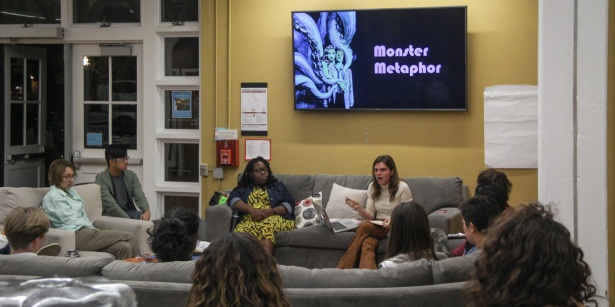
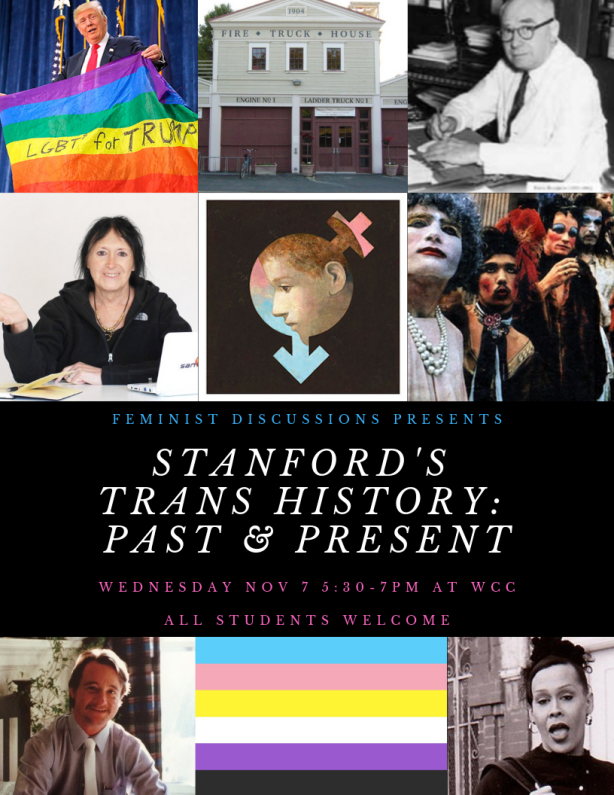
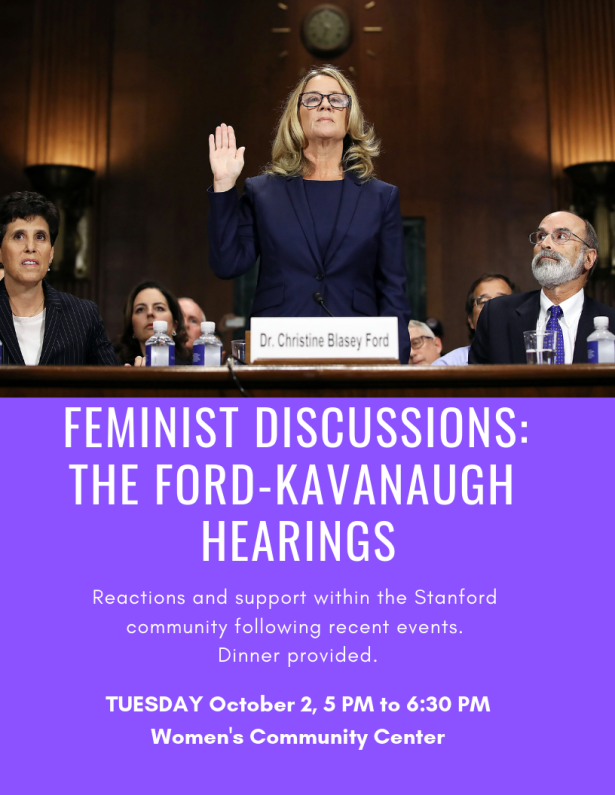 On October 2, 2018 we hosted a discussion event open to all students on campus who wanted to connect with others about the Ford and Kavanaugh hearings in Washington DC. We felt this event was necessary on a campus where people sometimes feel isolated from national issues. The result, a WCC packed with undergrad and grad students, affirmed our prediction. Our online RSVP had 50 sign-ups, but our estimate once the event was over was closer to 60. Luckily, we over-ordered food since we predicted this might happen.
On October 2, 2018 we hosted a discussion event open to all students on campus who wanted to connect with others about the Ford and Kavanaugh hearings in Washington DC. We felt this event was necessary on a campus where people sometimes feel isolated from national issues. The result, a WCC packed with undergrad and grad students, affirmed our prediction. Our online RSVP had 50 sign-ups, but our estimate once the event was over was closer to 60. Luckily, we over-ordered food since we predicted this might happen.